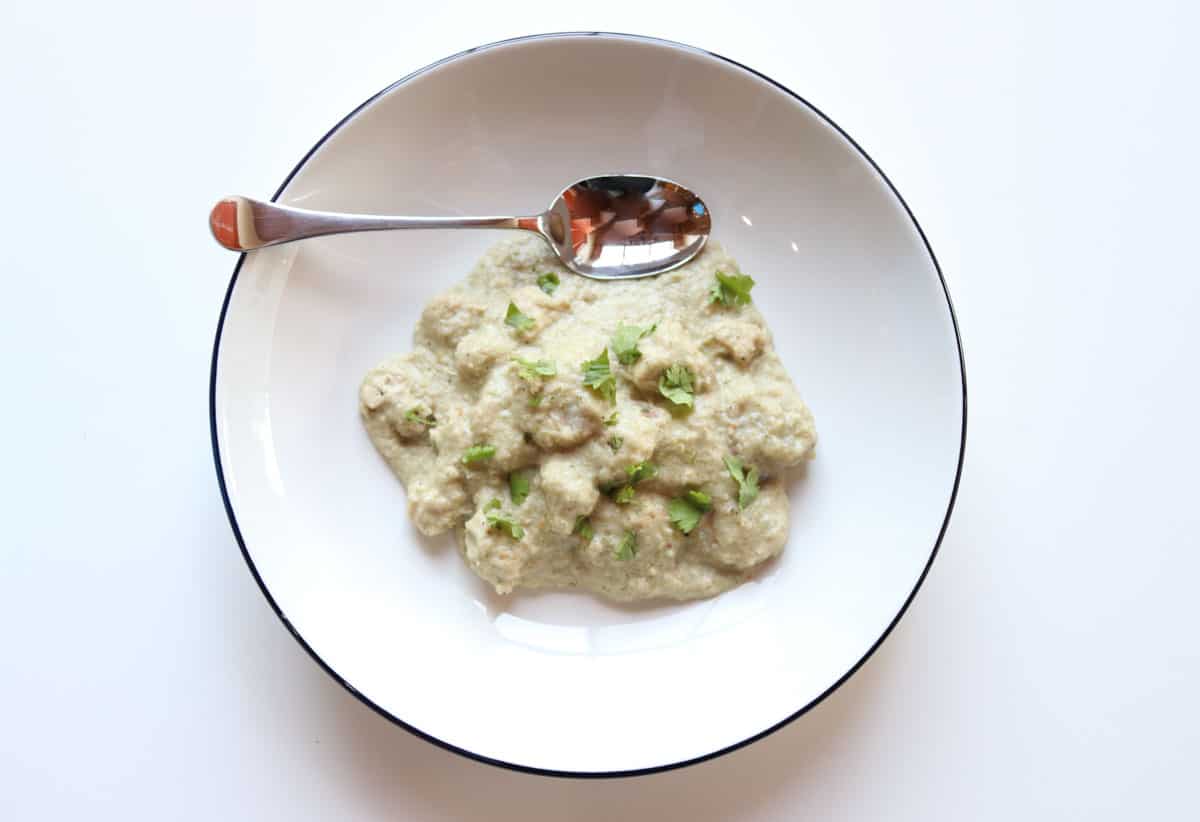
"Xinxim de galinha is like a who's who of Bahian ingredients: dendê oil, shrimp, peanuts, coconut milk. Dedicated to the goddess Oxum in Candomblé rituals, it's one of the most iconic Afro-Brazilian dishes and is usually eaten alongside other regional dishes like caruru de camarão (Bahian Shrimp and Okra Gumbo), or vatapá (Bahian Shrimp Stew)."
- Chef Virgilio Martínez
There's nothing quite like cooking your way through the continents. As part of our primary and elementary geography & cultural studies, we're making our way around the world and it has been a blast so far.
Today, we're going to share our experience making South American food. More specifically, we're going to talk about how to make Xinxim de Galinha or Bahian Chicken Stew.
Grab your own printable kid-friendly recipe for making Xinxim de Galinha or Bahian Chicken Stew down at the bottom.
Learn more about cooking with kids.
If you like this, you should try Argentine pizza, chicken parmesan, West African rice and beans, sambusas, oxtails, bison chili, pork belly, rabbit stew, stuffed turkey, salsa in the molcajete, and how to cure a molcajete.
Disclosure of Material Connection: Some of the links in the post are “affiliate links.” This means if you click on the link and purchase the item, I will receive an affiliate commission. Amazon links are not affiliate links. You can read my full affiliate disclosure.
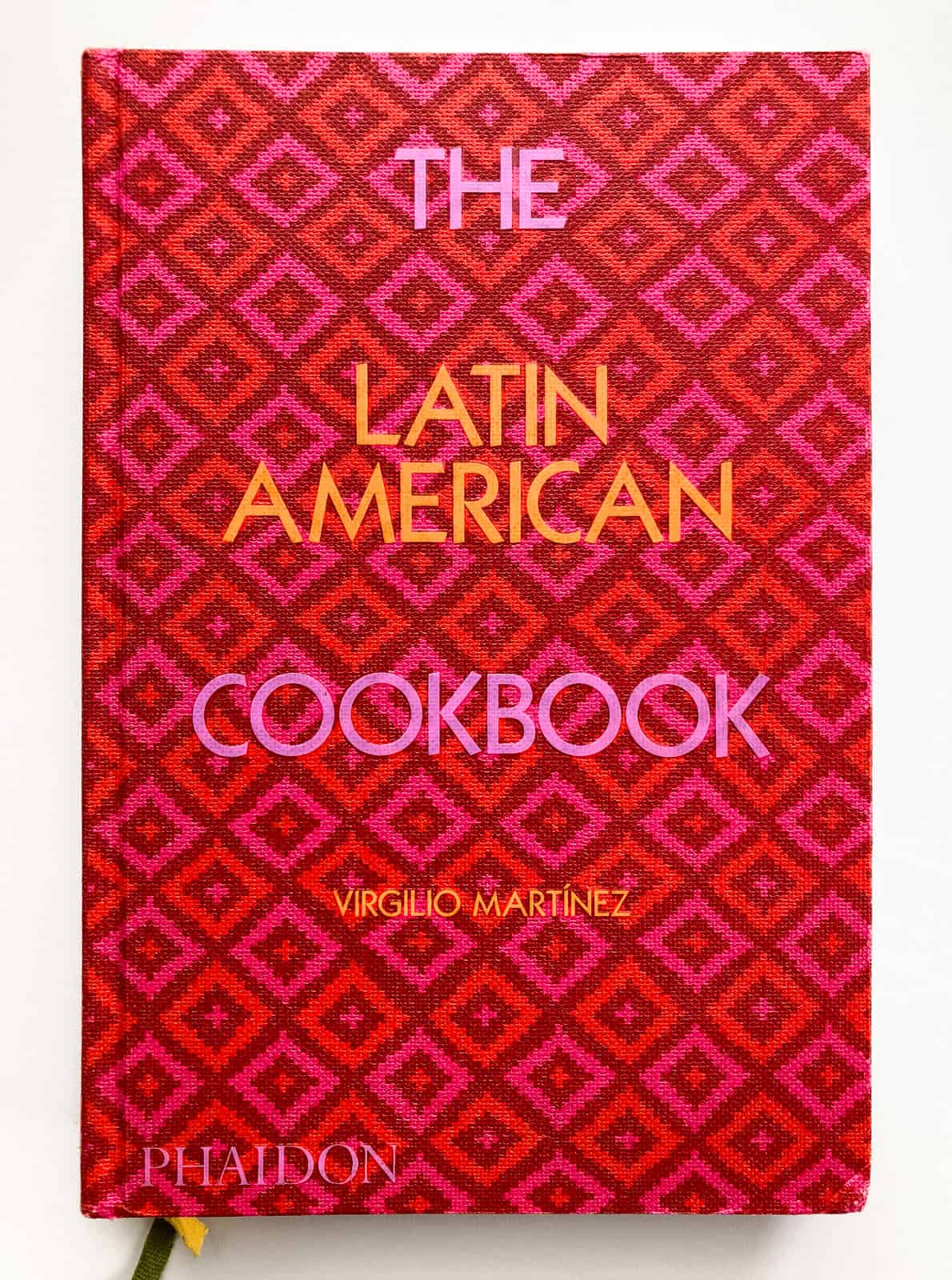
After studying Africa and Black history this Afro-Brazilian dish, Bahian Chicken Stew, from The Latin American Cookbook by Chef Virgilio Martínez is a perfect way to begin our next culinary adventure in South America.
The kids really enjoy exploring this cookbook. There are a ton of recipes, as in 600. The food and landscape photography is stunning.
Our kids also like the look and feel of the cookbook cover, along with its pink tones, which remind them of the Montessori continent color for South America.

Family & Kid's Cooking Resources
Beautiful and diverse cooking resources for you!
Stop by our shop to see more Family & Kids' Cooking Resources.
Learn more about allergies and your family.
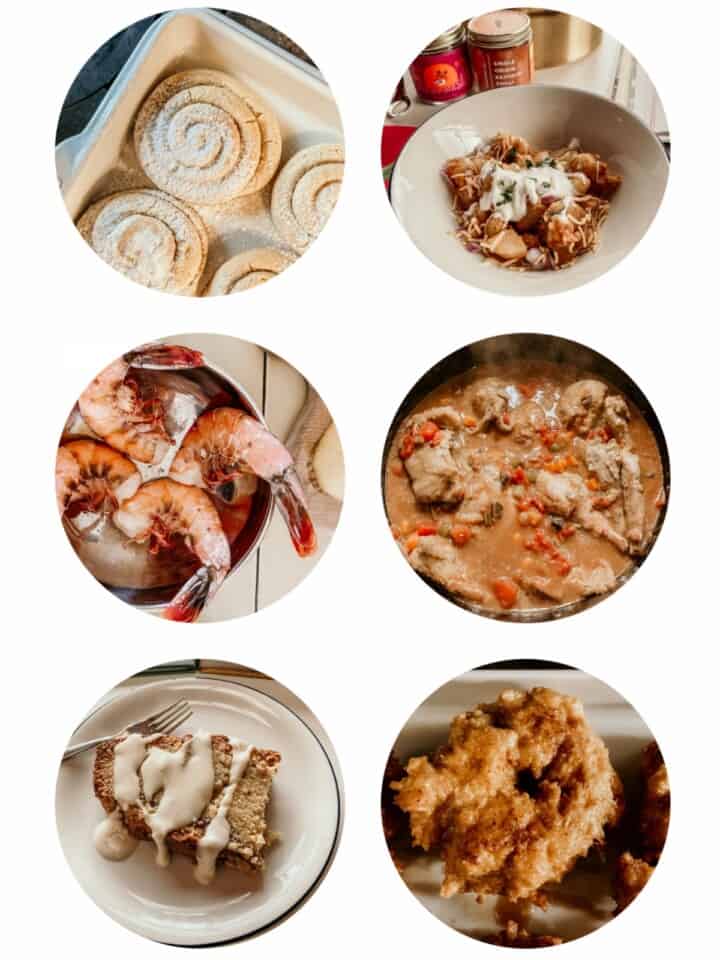
Food from Around the World: Free Cooking Lessons
Learn from some of the most talented chefs around the world!
Free Cooking Course for Families
Discover recipes for every continent! Sign up to receive free cooking lessons for the whole family. Learn from some of the most talented chefs around the world and participate in the quality practical life experiences Montessori education is known for.
Find out more about the cooking course.
Where is Bahia?
Bahia is a state in the northeastern part of Brazil and is known for its vibrant Afro-Brazilian culture, including samba music and dance as well as Candomblé. Bahia consists primarily of Coconut Coast, All Saints Bay, Dendê Coast, Cacao Coast, The Discovery Coast, The Whale Coast, and The Diamantina Tableland Region.
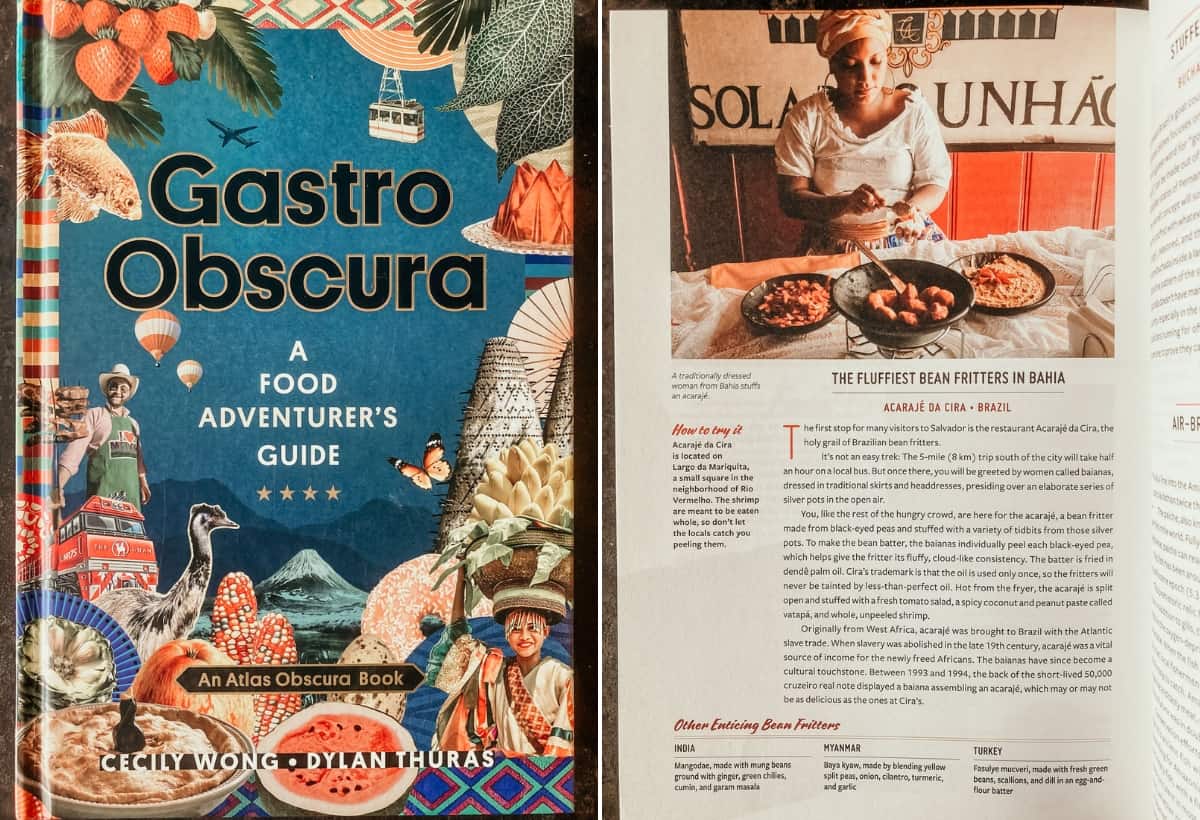
Gastro Obscura takes a closer look at Bahian cuisine while inviting readers on a journey of wonder and exploration around the globe.
Learn more about Bahia.
Brazil also happens to be the largest country in South America and Latin America.
What is Dendê Oil?
Dendê oil comes from the coconut of the dendezeiro, which is a palm tree. The coconut is small with red-orange skin. The oil itself is a bright red color and it is produced using a traditional artisanal process. Dendê oil plays an important role in culinary and religious customs in Bahia and the rest of Brazil. However, it is not always readily available due to several contributing factors.
What is the Language of Brazil?
The language of Brazil is Portuguese or Brazilian Portuguese. Brazil is the only country in both North and South America with an official language of Portuguese. The dish we are making is Bahian Chicken Stew or Xinxim de Galinha in Portuguese.
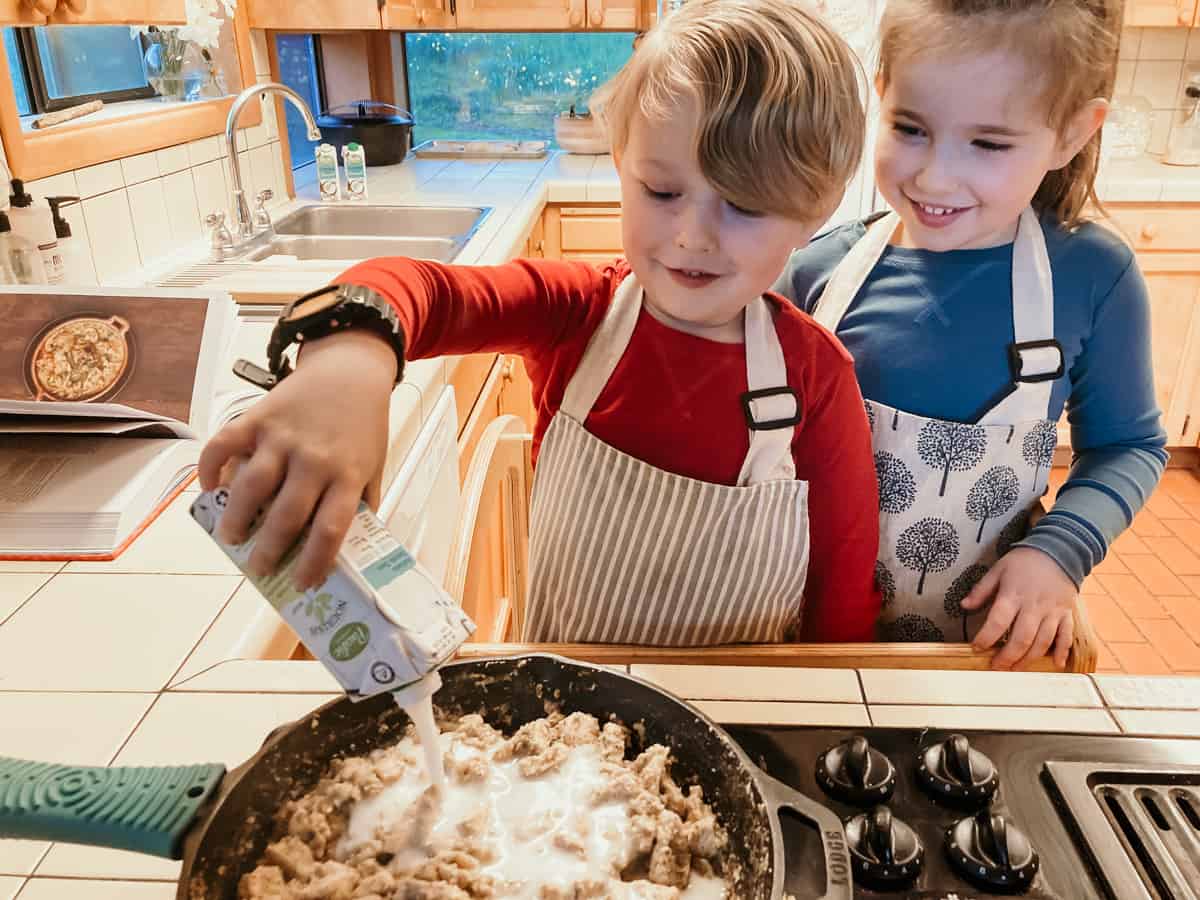
Easy South American Food: Xinxim de Galinha, Bahian Chicken Stew
Our version of this dish is very similar to the recipe in the cookbook. However, there are a couple of things we should mention before getting started.
First, the recipe calls for a whole chicken cut into pieces. Since our version is geared toward preschool and up, I broke down the chicken and provided them with the pieces already cut up in a dish and ready to begin.
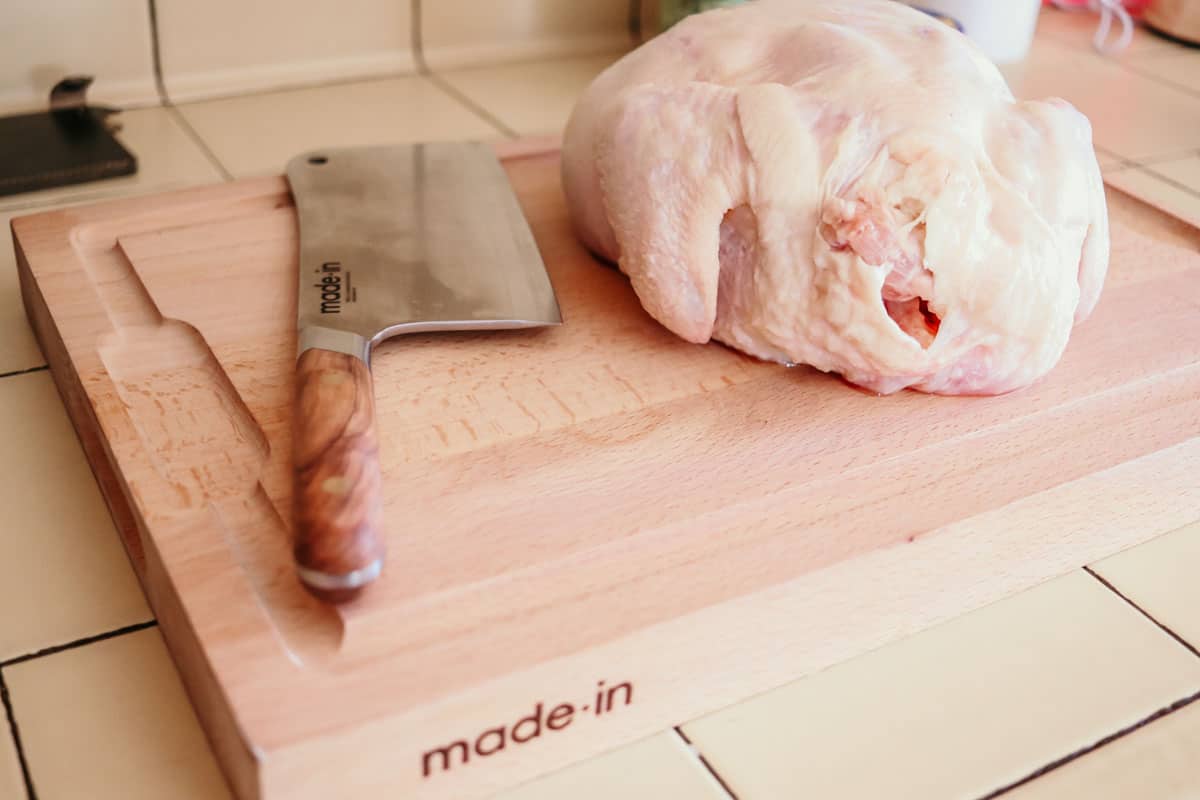
Now, if your kids can break down a whole chicken themselves while adhering to food safety guidelines, then by all means knock yourselves out. My kids are a bit young for that. Also, if you don't have a whole chicken, another alternative would be to substitute two large chicken breasts cut into pieces.
Second, we weren't able to find any dendê oil available for purchase, despite shopping around several places in our area. However, you may be able to find it online if you're willing to purchase it that way. We found that coconut oil is a reasonable substitute for dendê oil as the dish tasted fantastic. Therefore, that's what we recommend using if you're unable to get your hands on this staple Bahian ingredient.
Also, since this recipe contains shrimp, it would be prudent to familiarize yourself with shellfish allergies, if you haven't already done so.
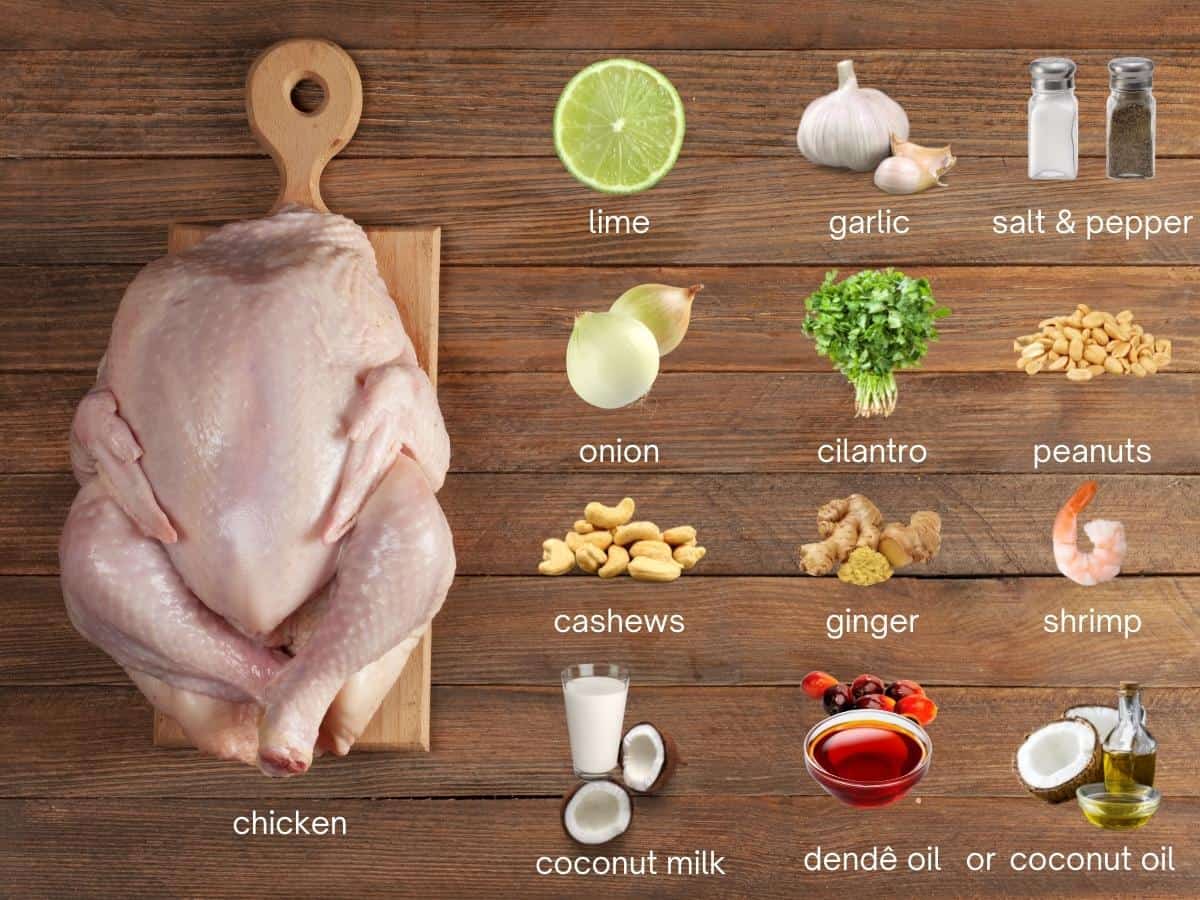
Ingredients
- Whole Chicken (4-5lb) or Large Chicken Breasts
- Lime Juice or a Lime
- Garlic
- Ground Pepper
- Dendê Oil or Coconut Oil
- Onions
- Cilantro
- Roasted Peanuts
- Cashews
- Ginger
- Shrimp
- Coconut Milk
- Salt
Equipment
- Butcher Knife
- Butcher Block
- Prep Bowls
- Child-Friendly Knife
- Oregon Myrtlewood Cutting Board
- Measuring Spoons
- Measuring Cup
- Manual Citrus Press optional
- Blue Carbon Steel Pan
- Blender
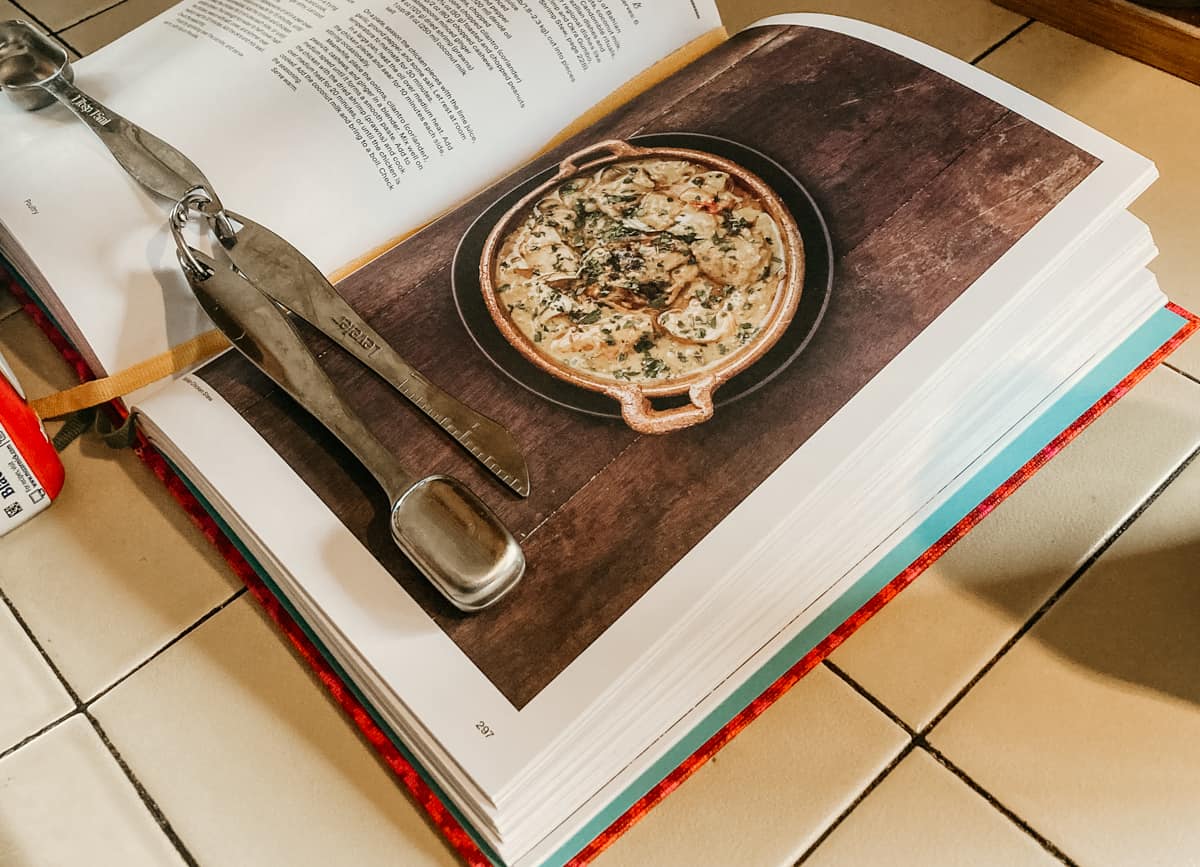
1. Wash Hands, Gather Ingredients, & Explore the Cookbook
The kids washed their hands and gathered the ingredients for the Brazilian chicken dish while I broke down the chicken and placed the pieces in a dish. Do not rinse raw chicken.
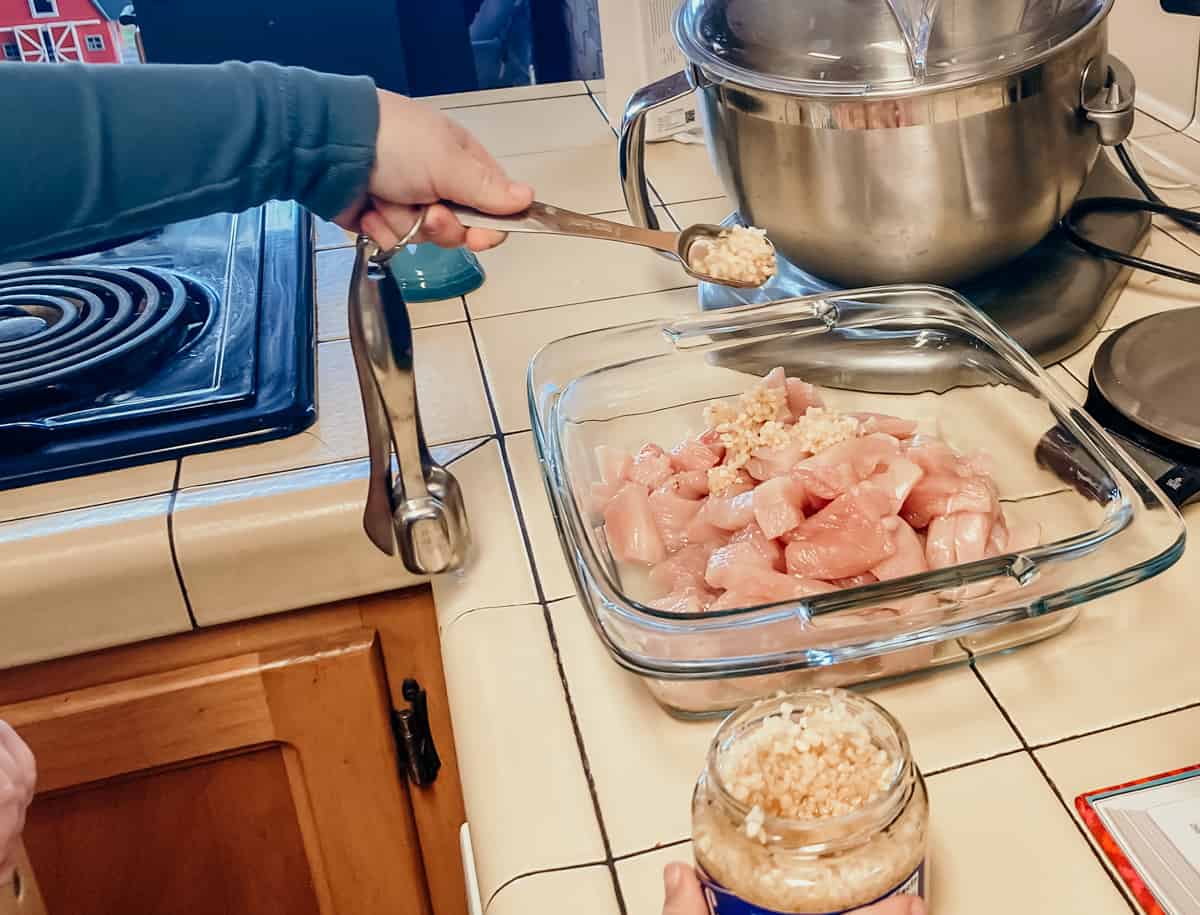
2. Add Lime Juice and Garlic to the Chicken
Add 2 tablespoon or juice of 1 lime to the chicken dish followed by the garlic. This is a good time to introduce or reinforce any lessons about food safety. Handwashing before and after handling meat, poultry, seafood, or eggs as well as washing plates, utensils, or cutting boards after contact with those same items to prevent cross-contamination is important.
If you have a manual citrus press, this is a great opportunity to use it. It's a great tool for hand strengthening and children can use it independently, depending on the thickness of the lime slices.
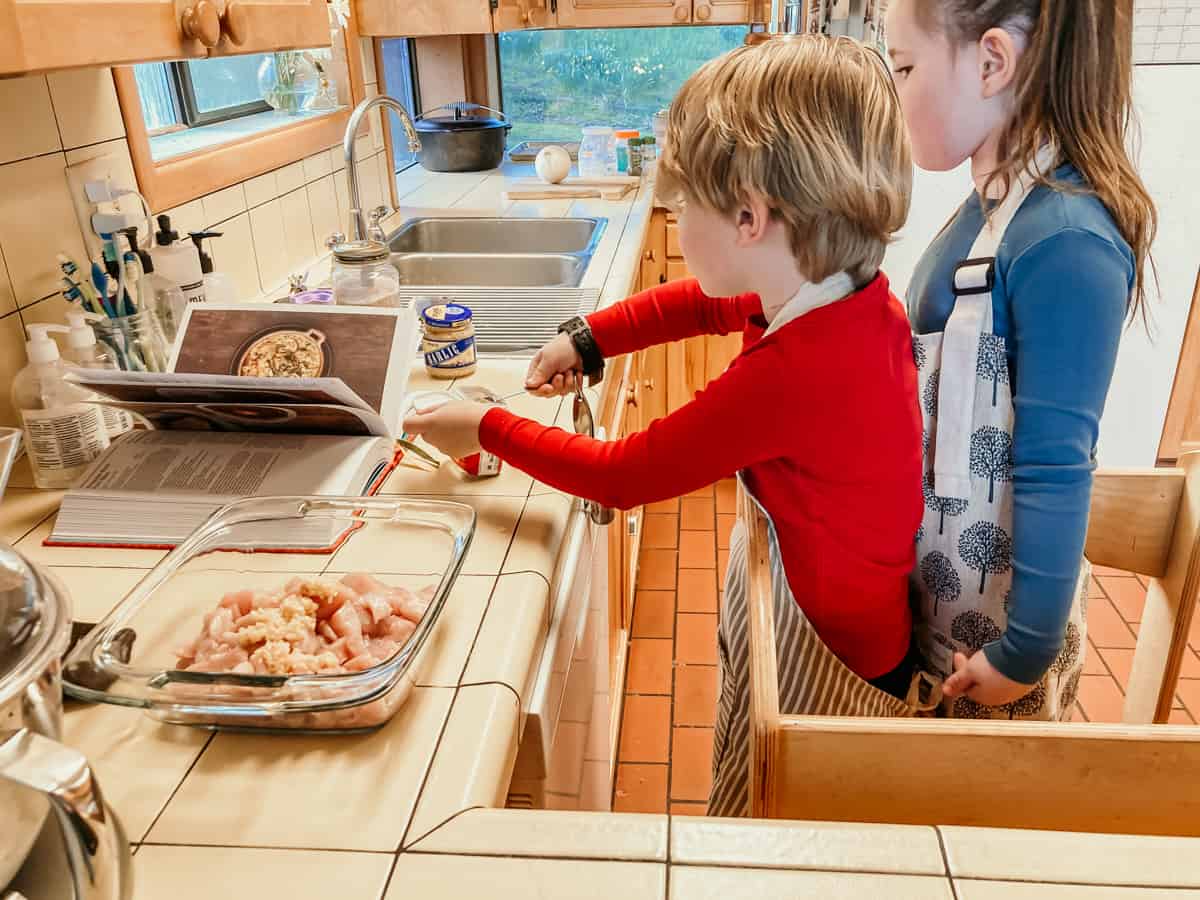
3. Add Salt & Pepper and Let Marinate
Add the salt and pepper to the chicken. Stir with a metal spoon and let it marinate for 30 minutes. We covered ours and placed it in the refrigerator to marinate.
Wash your hands and the metal spoon (or grab a clean one) before moving on to the next step.
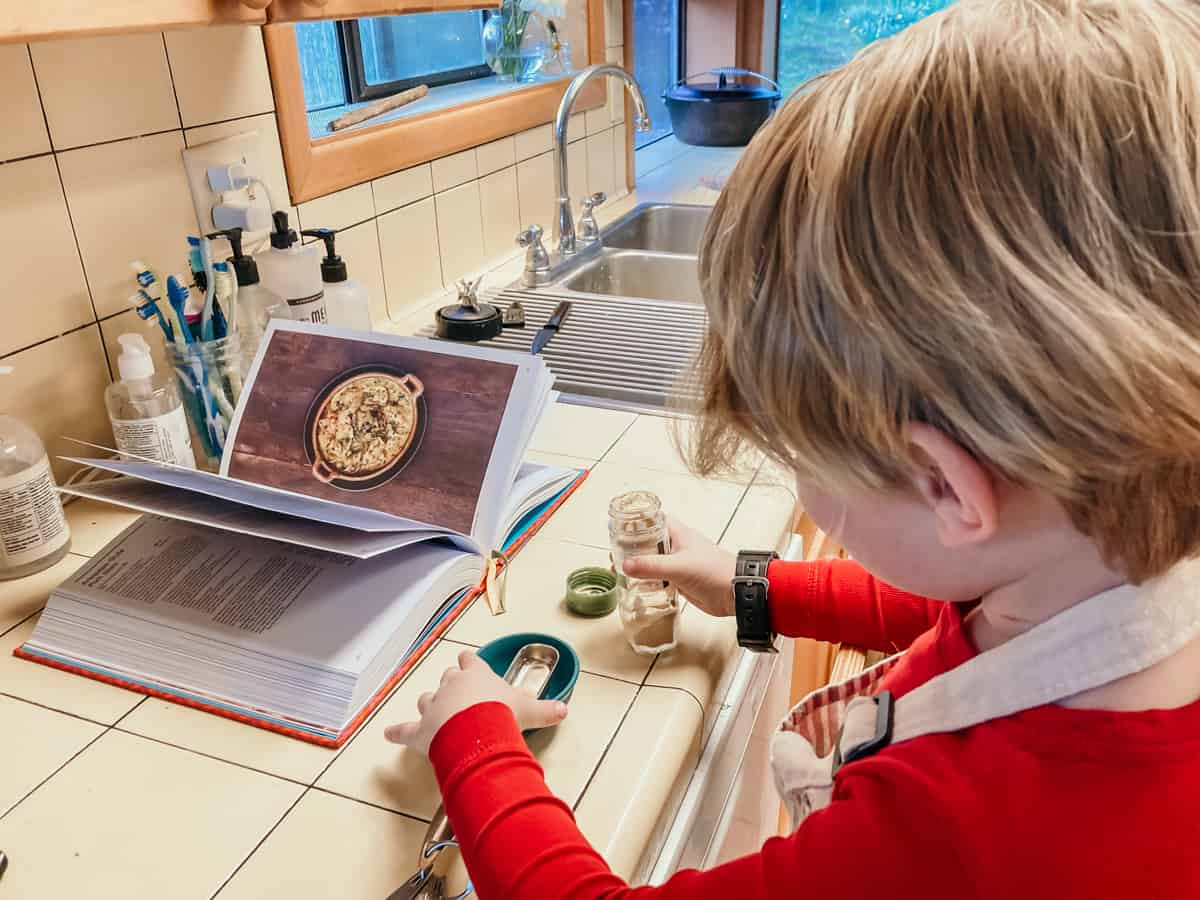
4. Set Aside the Remaining Ingredients for the Blender
While the chicken is marinating, chop the cilantro and ginger. Measure the cilantro, peanuts, cashews, and ginger, and set aside for the blender. Here is an example of how we peel and chop ginger.
Noah has a unique way of measuring that works well for him. He rests the measuring spoon on the bowl and holds the bowl with one hand while he carefully pours it with the other hand. As a result, whatever misses the measuring spoon still makes it into the bowl. In theory.
This is also a great time to explore the cookbook further and learn about South American Food/Latin American Food.
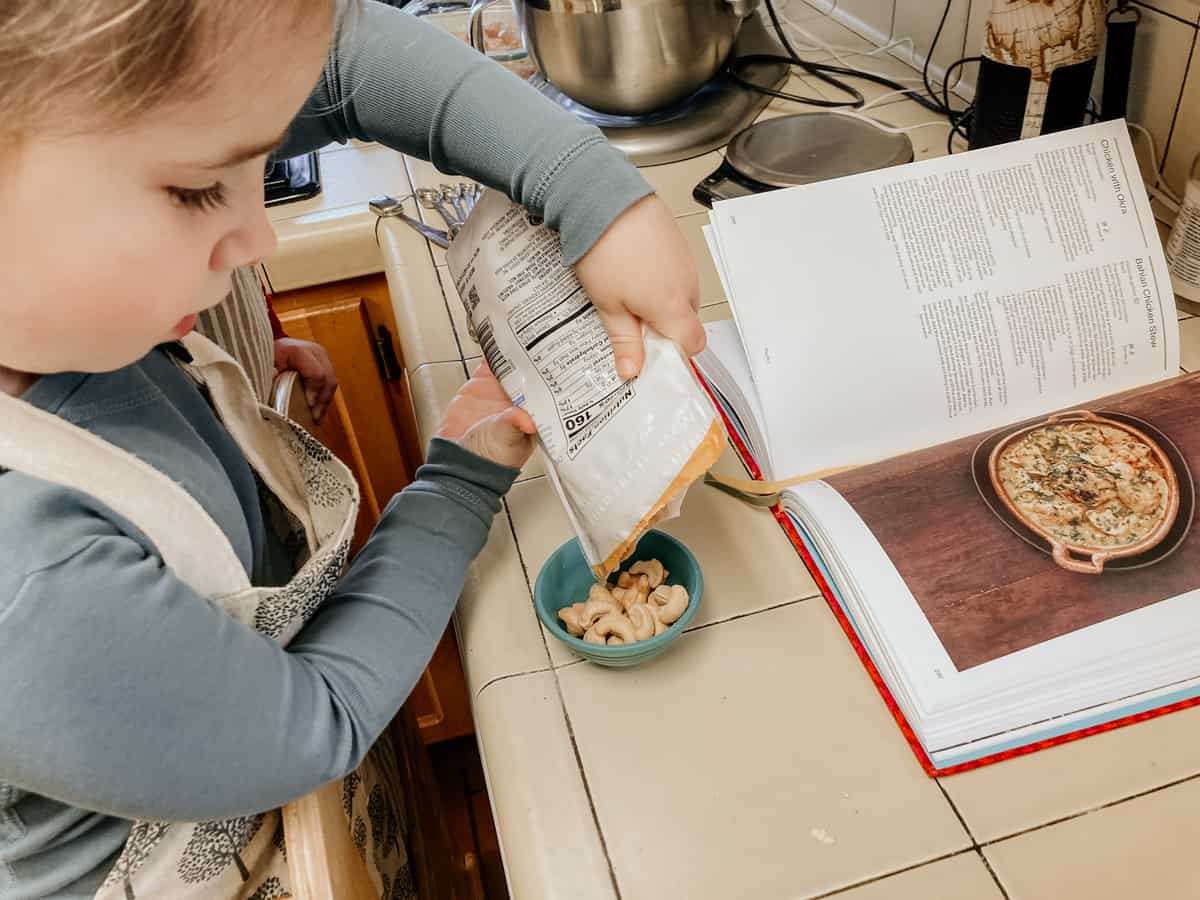
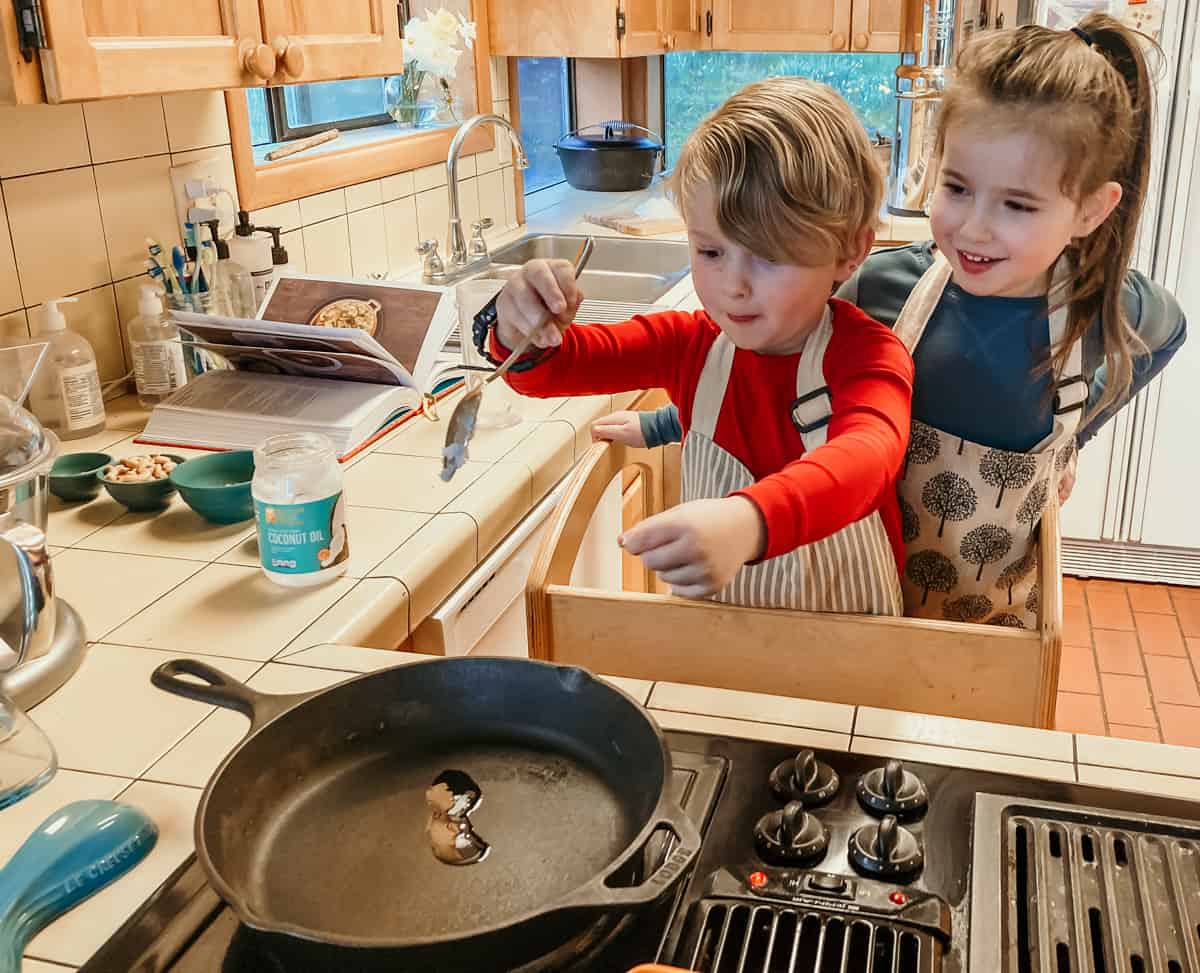
5. Add Oil to the Pan
Turn the stove on to medium heat. Preheat any cast iron cookware for approx. 5 minutes. Add the oil to the pan.
The kids love cooking with coconut oil because of how it immediately changes phase from solid to liquid with the addition of heat. In fact, coconut oil's low melting point of 76 degrees Fahrenheit means your kids can observe the phase change on a warm spring day without any additional heat source. Lots of opportunities for experimentation there.
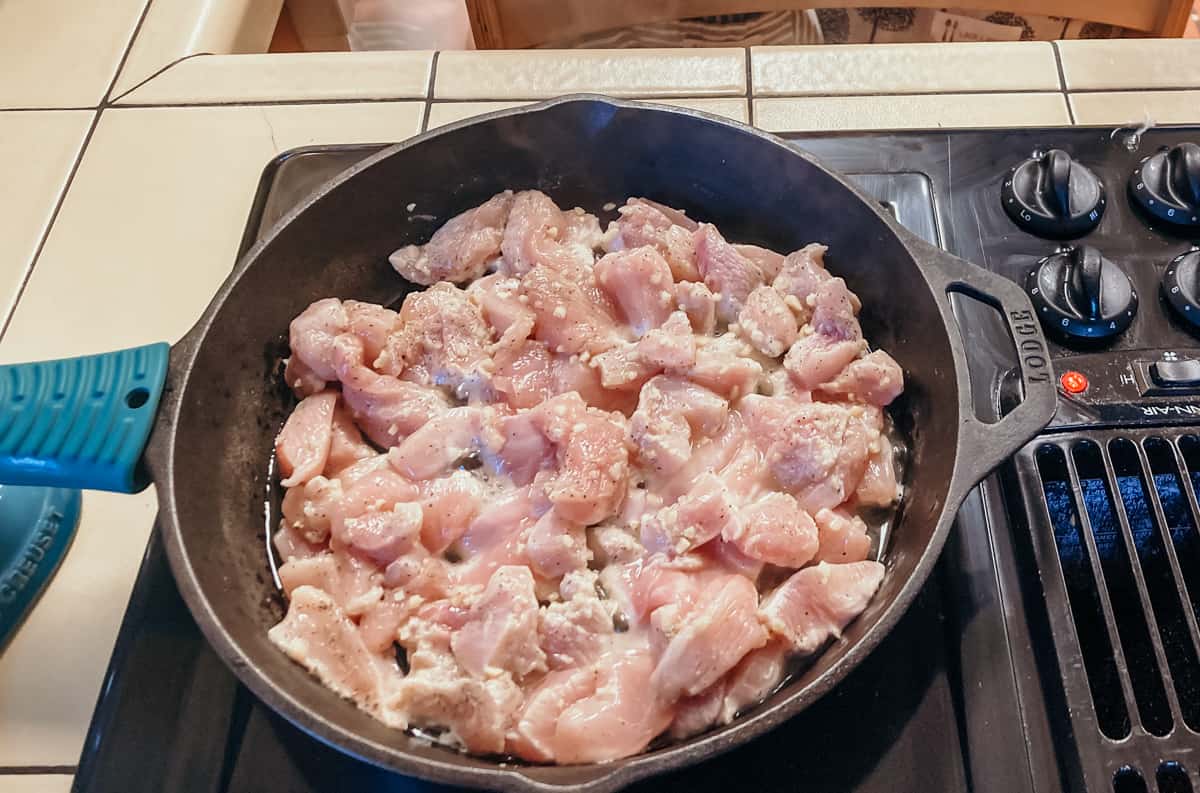
6. Transfer the Chicken to the Pan
Transfer the chicken to the pan. Sear for 10 minutes on each side. Wash your hands, the spoon, and the dish.
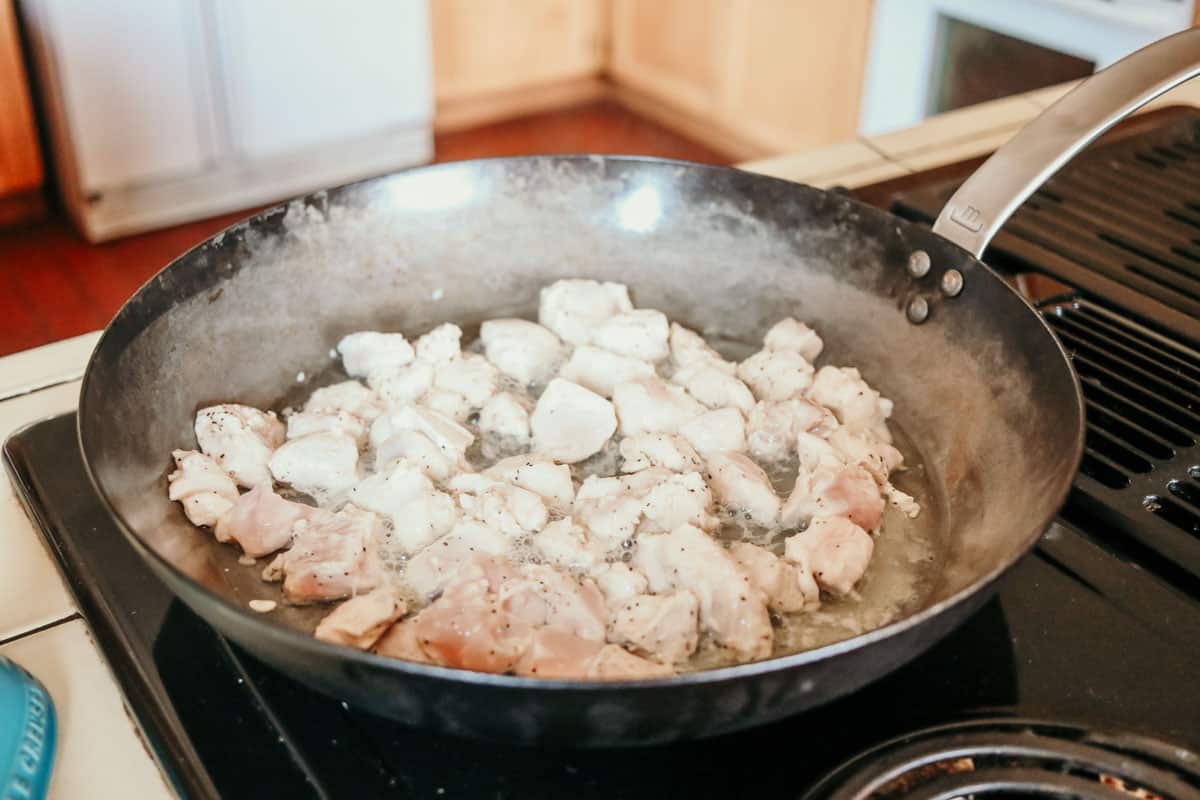
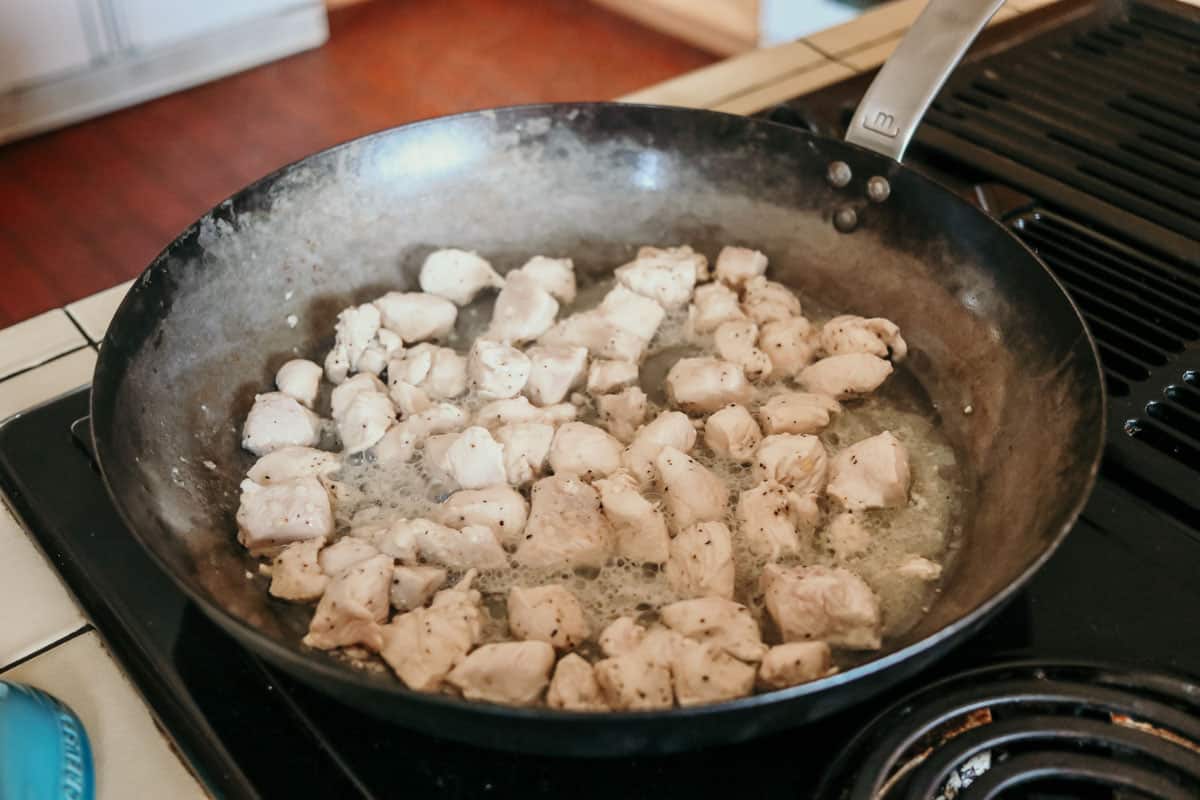
Do not reuse marinades used on raw foods.
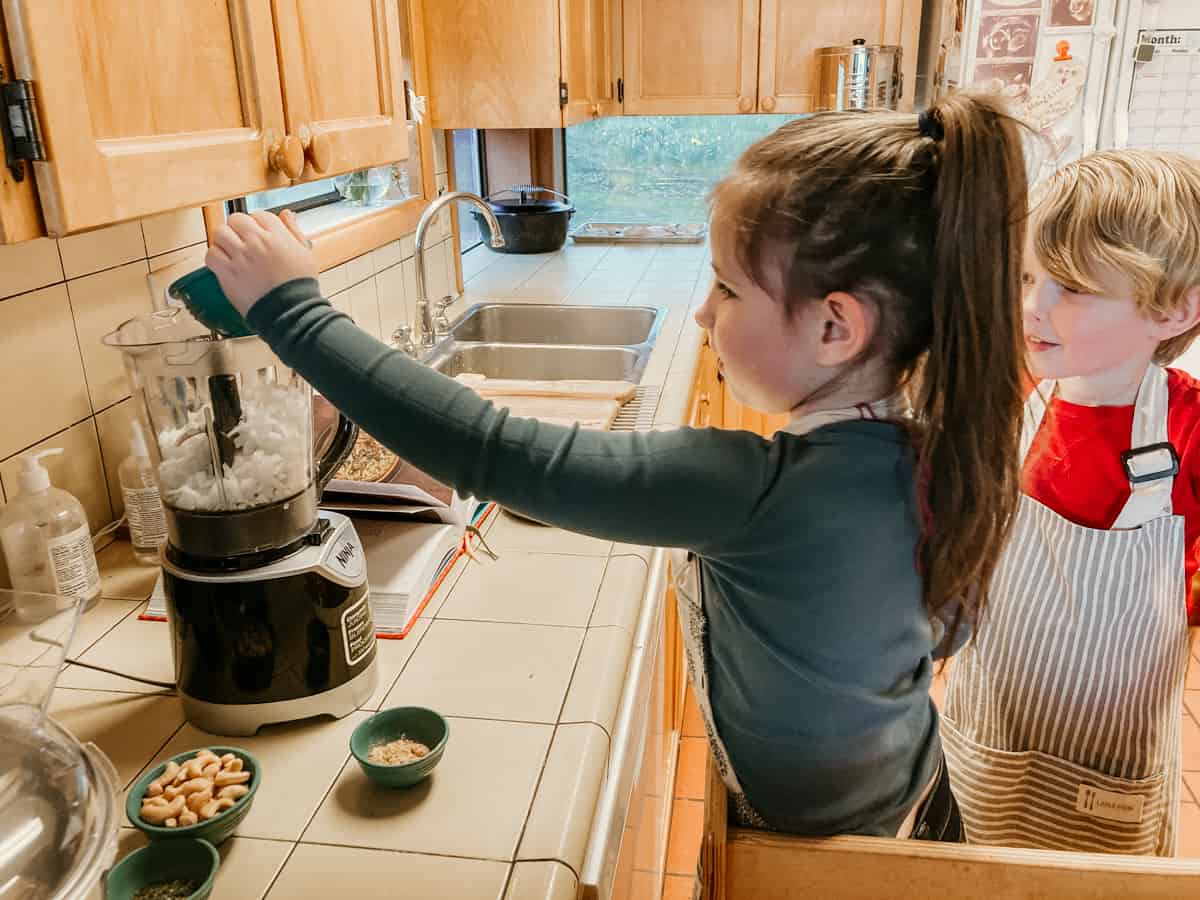
7. Chop Onions and Add to the Blender
Chop the onions with a knife and cutting board. Transfer to the blender.
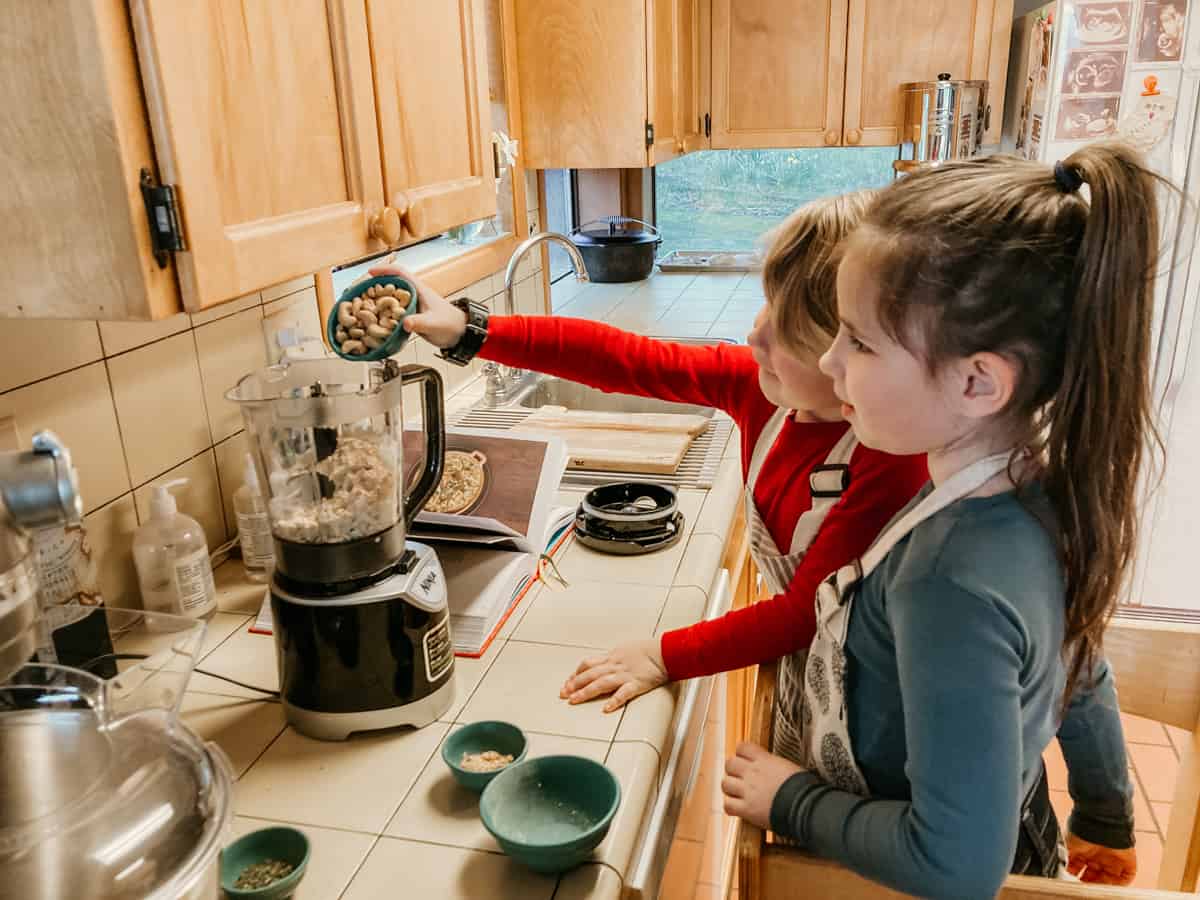
8. Add the Remaining Spices to the Blender
Add cilantro, peanuts, cashews, and ginger to the blender.
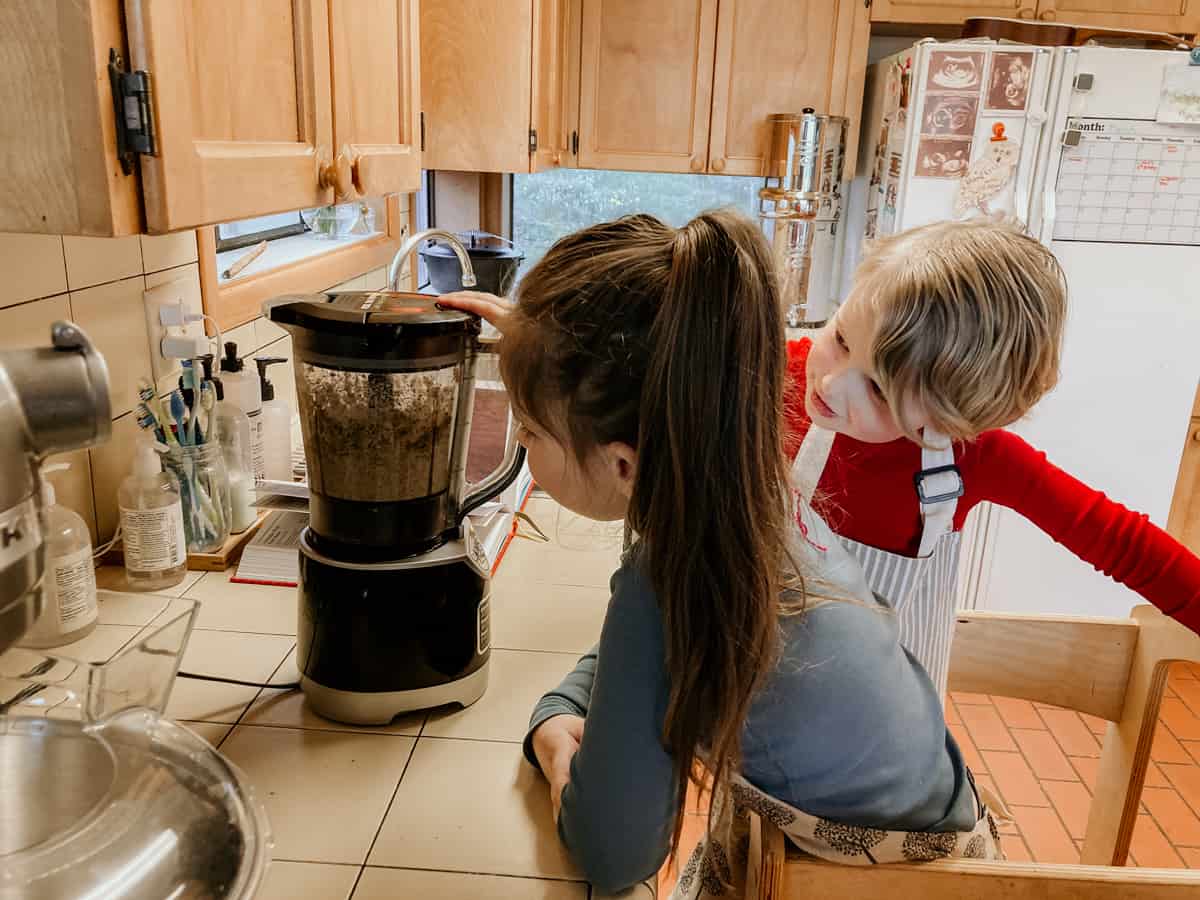
9. Blend Until a Smooth Paste is Formed
Cover the blender and mix until a smooth paste is formed.
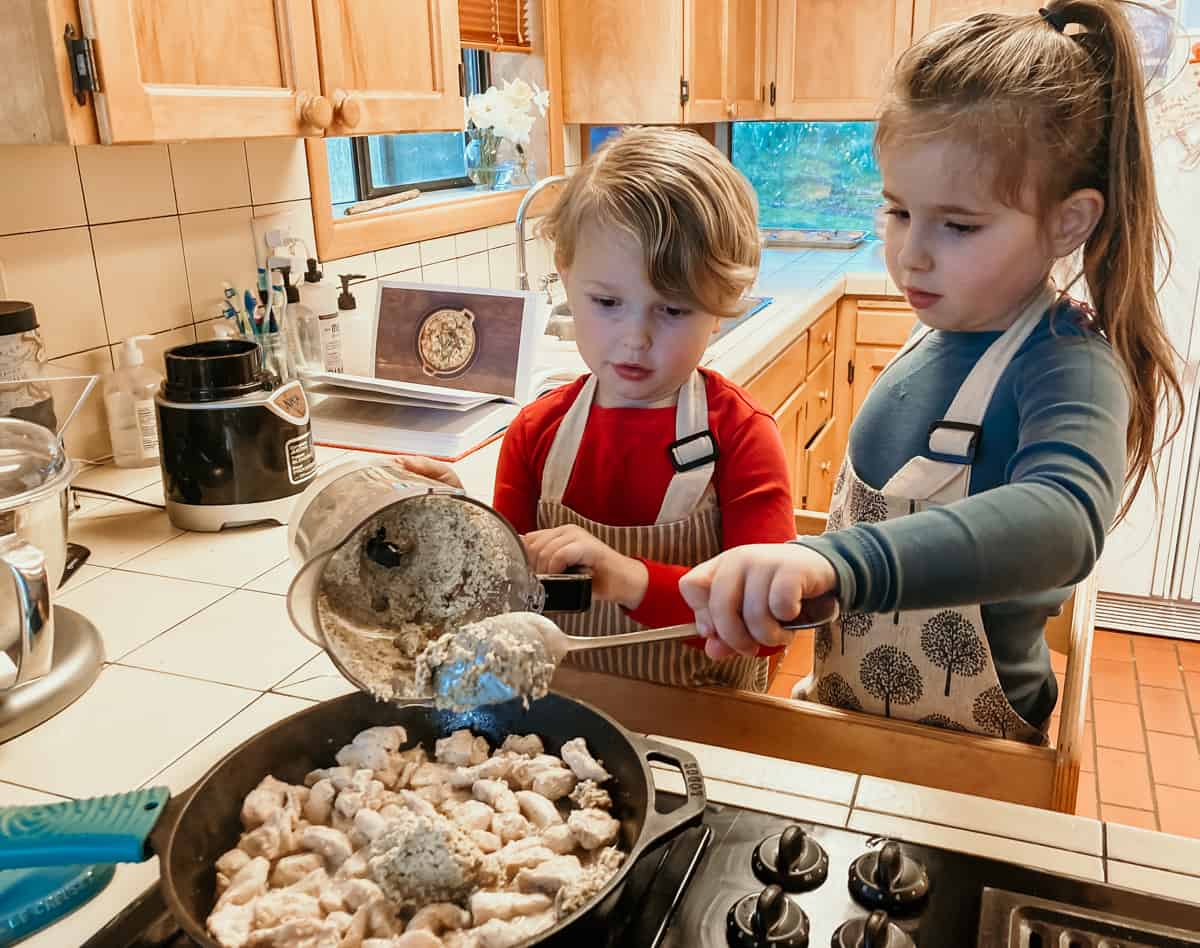
10. Add Paste and Shrimp to the Chicken
Using a clean spoon, transfer the paste to the pan with the chicken. Add the shrimp and mix it all together. Cook over medium heat for 20 minutes or until the chicken is cooked. Wash hands. The chicken is done when the internal temperature reaches 165 degrees Fahrenheit.
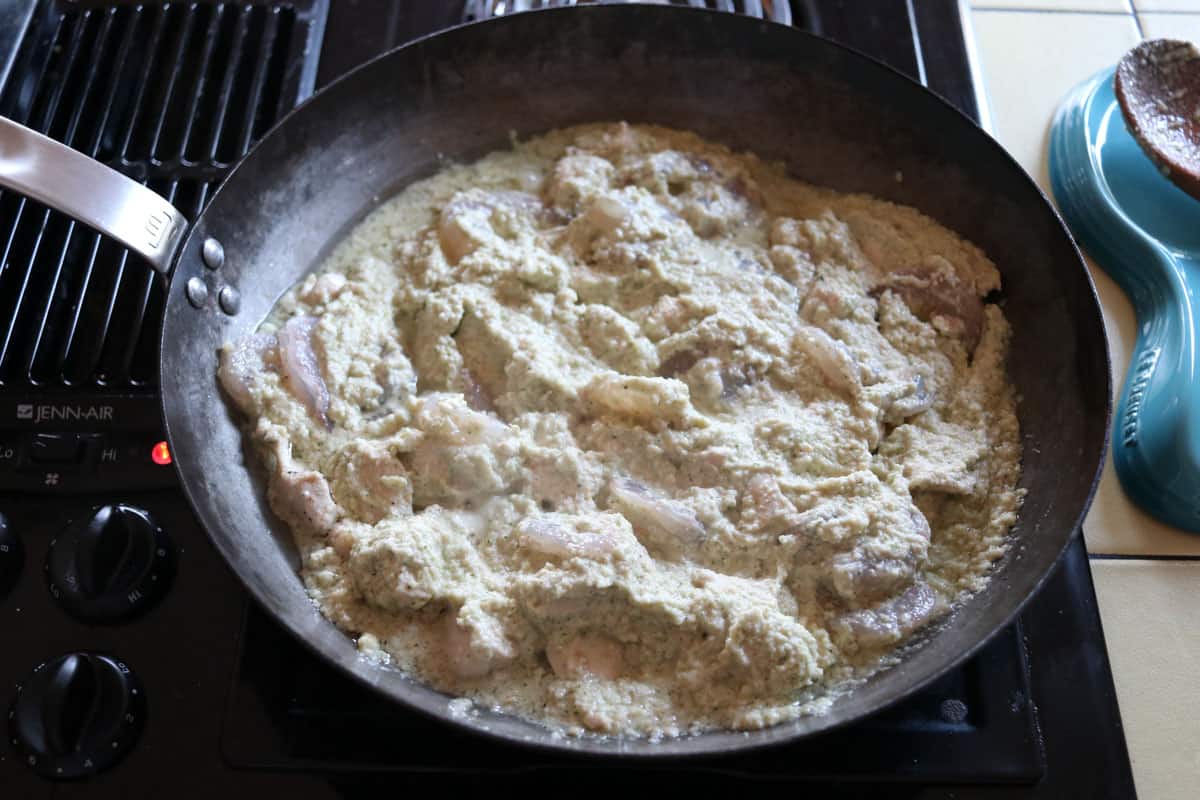
At this point, your kitchen should really start to smell incredible.

11. Add Coconut Milk to Your South American Food
Add the coconut milk to the pan and stir with a clean spoon.
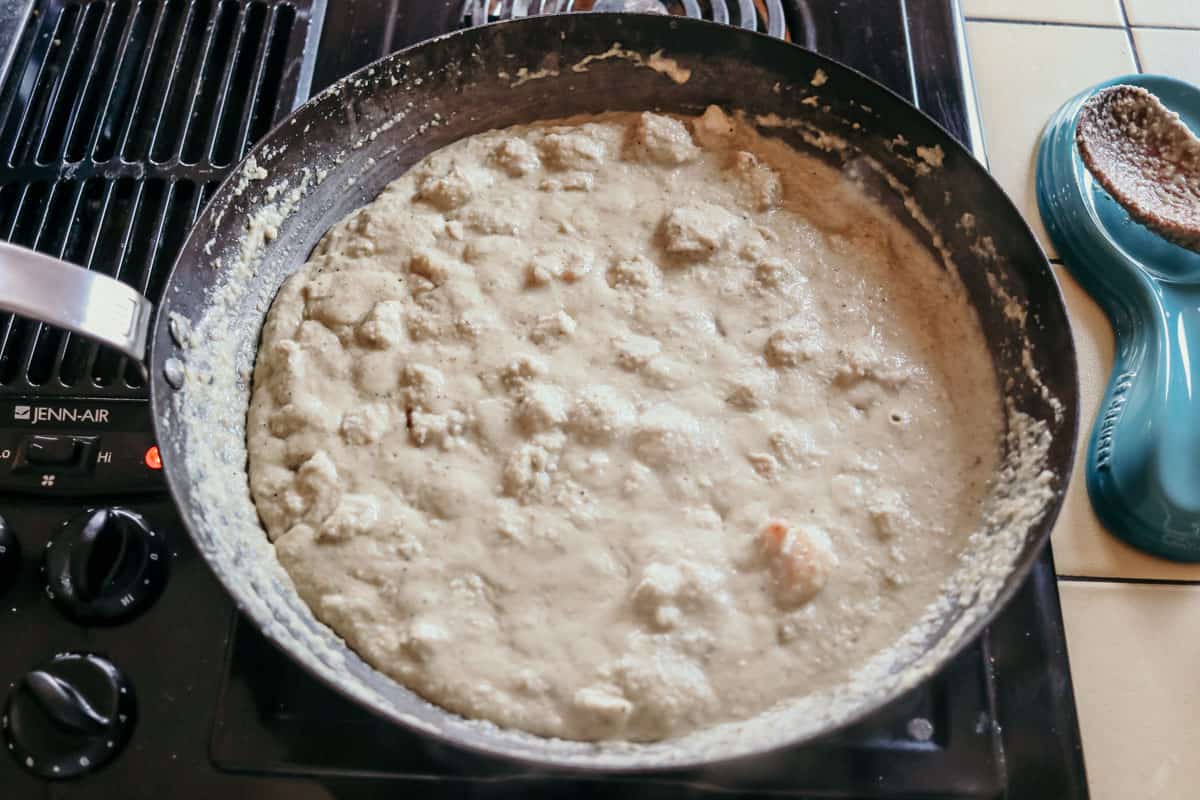
You're almost ready to enjoy this delicious chicken stew.
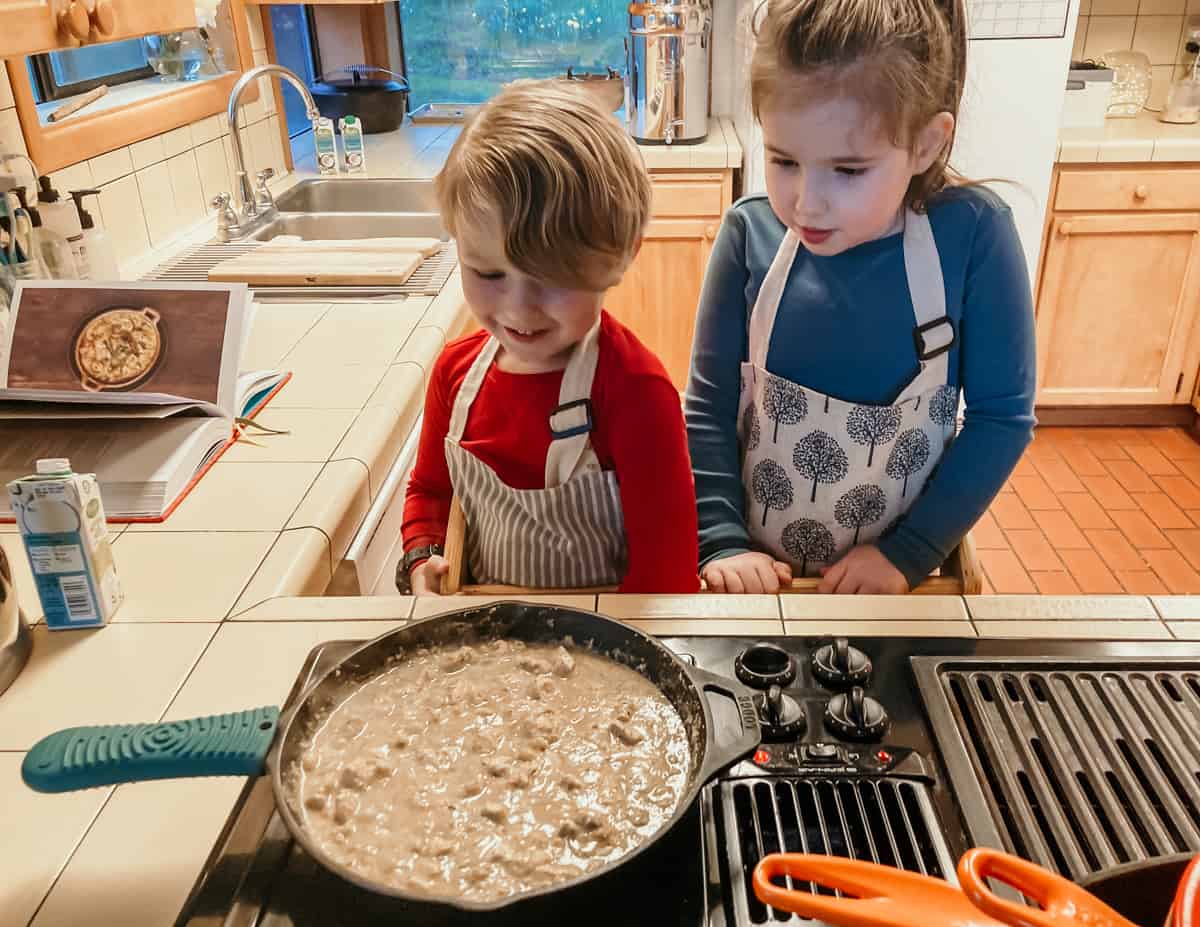
12. Bring to a Boil
Turn up the heat and bring it to a boil. We use medium-high heat for this step.

13. Serve Warm & Enjoy
Turn off the stove and serve your South American Food: Bahian Chicken Stew, Xinxim de Galinha warm. Enjoy!
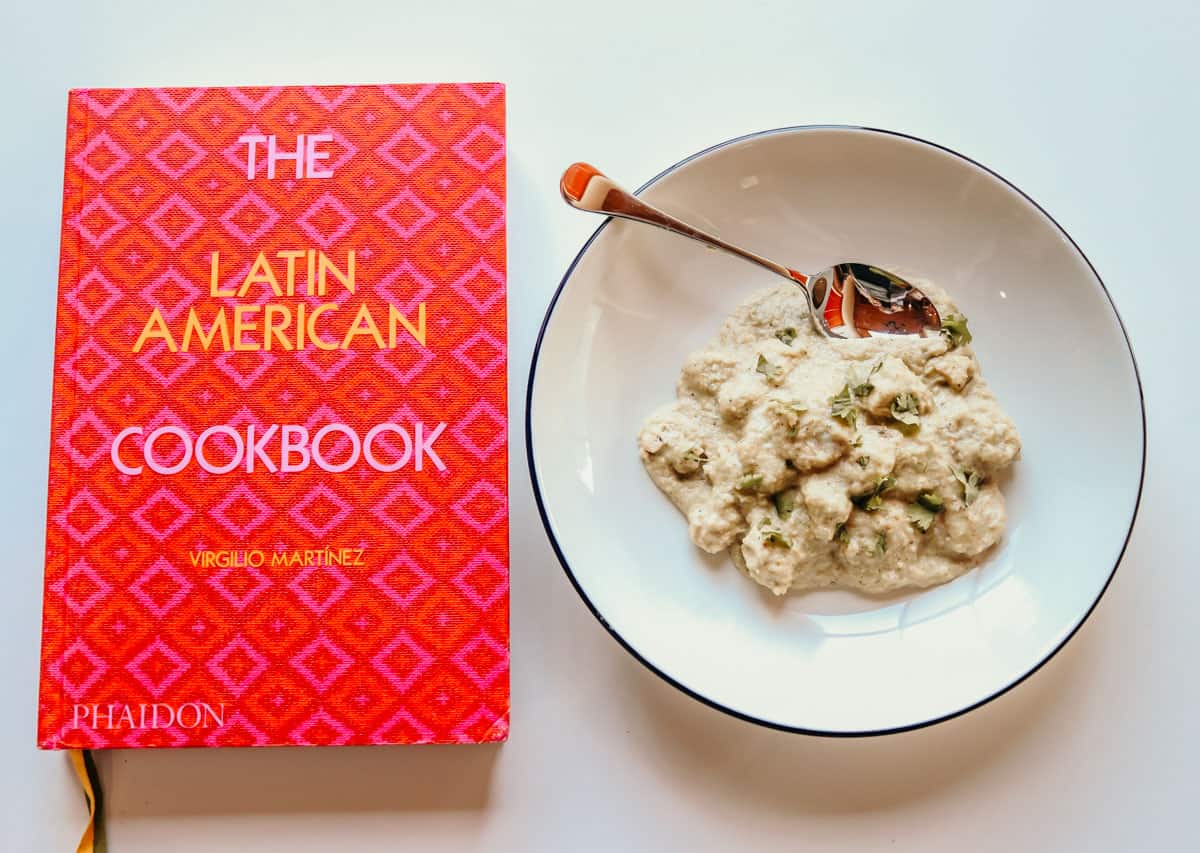
Conclusion for Easy South American Food: Xinxim de galinha, Bahian Chicken Stew
Bahian Chicken Stew is an easy and fun meal for kids to make. With a small amount of preparation, kids can create awesome food while learning history, geography, and culture. We hope you enjoyed seeing how we made this delicious dish and extended the learning through practical life in the kitchen.
The Latin American Cookbook is an excellent resource for learning about South America and Latin America. The recipes look and sound delicious, the layout is easy to navigate and there are symbols to denote whether a recipe is 5 ingredients or fewer, 30 minutes or less, Gluten-free, Vegetarian, and more.
Be sure to check out this recipe-packed cookbook. We like it so much that we made a free kid-friendly printable of this awesome Bahian Chicken Stew recipe for you to enjoy as well.

free recipe!
Bahian Chicken Stew
For you to try at home!
Free South American Food Recipe for Pre-Readers and Up
Grab your free printable recipe cards above. Kids can gather ingredients using the ingredient list and prepare the meal using the step-by-step recipe cards, with assistance as needed.
The cards are easy to use, include pictures, and encourage confidence and independence in the kitchen. They also make an excellent addition to your Montessori continent box for South America.
Montessori Continent Boxes
Explore every continent with these solid maple hardwood boxes.
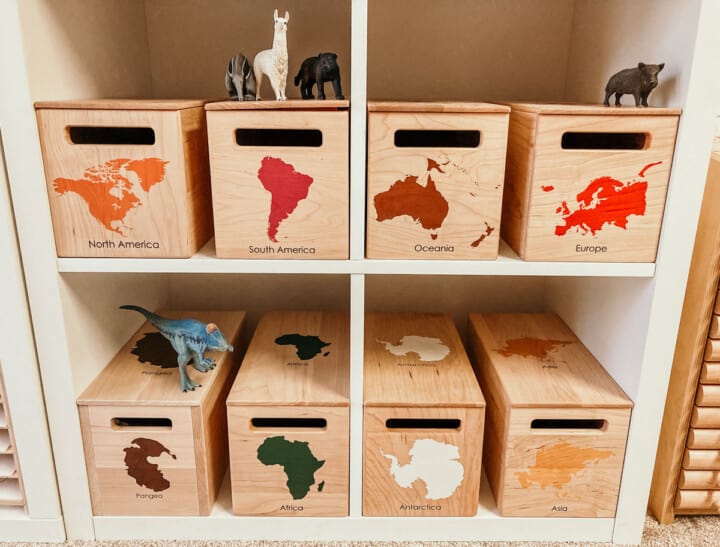
More South American Educational Resources
- Phaidon Previews The Latin American Cookbook
- Atlases for Kids
- Bilingual Spanish-English Books
- Waseca Biomes - South America
- 6 Afro Latinas You Should Know About
- Teaching Hard History: American Slavery
Save $15 on your first Waseca Biomes purchase here.
More in the Kitchen
- Ethiopian Sambusas
- Asian Dumplings
- Ukrainian Welcome Bread
- Aussie Barbecue Prawns
- Antarctic Expedition Food
- Thumbprint Cookies for Kids
- Blueberry Cake
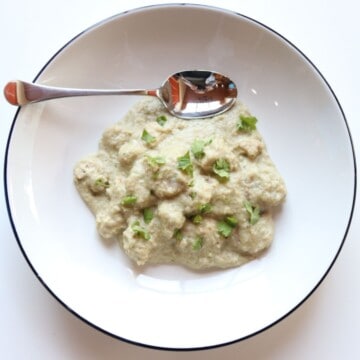
Easy South American Food: Xinxim de galinha, Bahian Chicken Stew
Equipment
- Manual Citrus Press optional
- Metal Spoons
- Learning Tower as needed
Ingredients
- 1 Whole Chicken 4-5lb or 2 Large Chicken Breasts, cut into pieces
- 2 tablespoon Lime Juice or 1 Lime
- 4 Garlic Cloves minced
- 1 teaspoon Ground Pepper
- ½ cup Dendê Oil or Coconut Oil
- 2 White Onions chopped
- 2 tablespoon Cilantro chopped
- ½ cup Peanuts roasted
- ½ cup Cashews chopped
- 2 tablespoon Ginger minced
- 4 oz Shrimp dried
- 1 cup Coconut Milk
- Salt
Instructions
- Wash Hands, Gather Ingredients, & Explore the Cookbook. Kids can wash their hands and gather the ingredients for the Brazilian chicken dish while you break down the chicken and place the pieces in a dish. Do not rinse raw chicken.
- Add Lime Juice and Garlic to Chicken. Add 2 tablespoon or juice of 1 lime to the chicken dish followed by the garlic. This is a good time to introduce or reinforce any lessons about food safety. Handwashing before and after handling meat, poultry, seafood, or eggs as well as washing plates, utensils, or cutting boards after contact with those same items to prevent cross-contamination is important. If you have a manual citrus press, this is a great opportunity to practice it as it strengthens hand muscles.
- Add Salt & Pepper and Let Marinate. Add the salt and pepper to the chicken. Stir with a metal spoon and let it marinate for 30 minutes. Cover and place it in the refrigerator to marinate. Wash hands and the metal spoon (or grab a clean one) before moving on to the next step.
- Set aside Remaining Ingredients for Blender. While the chicken is marinating, chop the cilantro and ginger. Measure the cilantro, peanuts, cashews, and ginger, and set aside for the blender. This is also a great time to explore the cookbook further and learn about South American Food/Latin American Food.
- Add Coconut Oil to the Pan. Turn on the stove to medium heat. Preheat any cast iron cookware for approx. 5 minutes. Add the oil to the pan.
- Transfer Chicken to the Pan. Transfer the chicken to the pan. Sear for 10 minutes on each side. Wash hands, the spoon, and the dish. Do not reuse marinades used on raw foods.
- Chop the onion with a knife and cutting board. Transfer to the blender.
- Add remaining ingredients (except coconut milk) to the blender.
- Cover the blender and mix until a smooth paste is formed.
- Add Paste and Shrimp to the Chicken. Using a clean spoon, transfer the paste to the pan with the chicken. Add the shrimp and mix it all together. Cook over medium heat for 20 minutes or until the chicken is cooked. Wash hands. The chicken is done when the internal temperature reaches 165 degrees Fahrenheit.
- Add the coconut milk to the pan and stir with a clean spoon.
- Turn up the heat and bring it to a boil. Use medium-high heat for this step.
- Turn off the stove and serve your South American Food: Bahian Chicken Stew, Xinxim de Galinha warm. Enjoy!
Notes
- Cook to internal temperature of 165 °F (74 °C)
- Do not use the same utensils on cooked food, that previously touched raw meat
- Wash hands after touching raw meat
- Don't leave food sitting out at room temperature for extended periods
- Never leave cooking food unattended
- Use oils with high smoking point to avoid harmful compounds
- Always have good ventilation when using a gas stove
- See more guidelines at USDA.gov.
- Full Lesson Info and Pictures at: https://happyhomeschooladventures.com/south-american-food
Nutrition
Estimated nutrition information is provided as a courtesy and is not guaranteed.

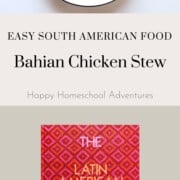
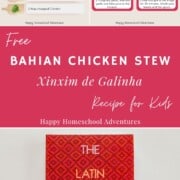
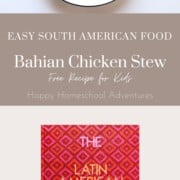
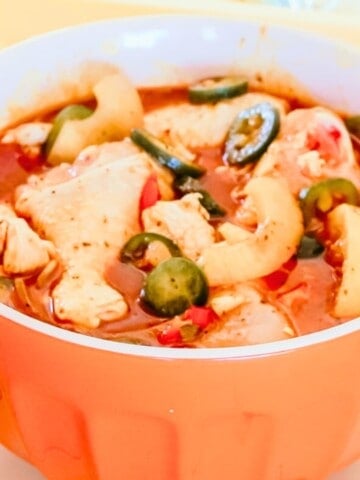
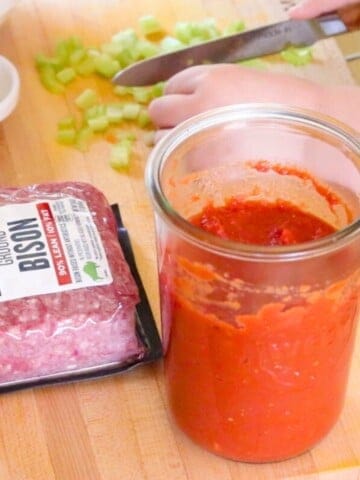
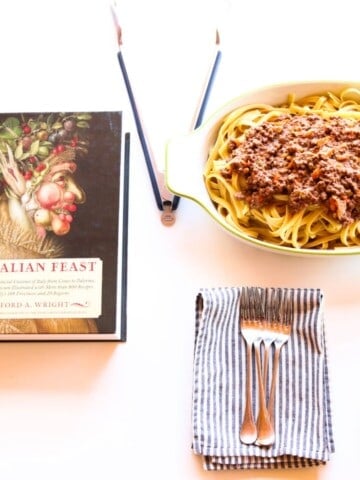

Leave a Reply